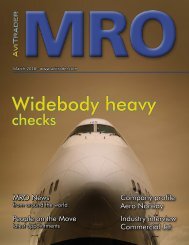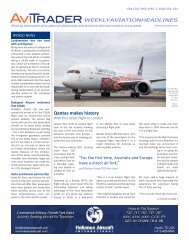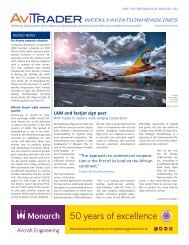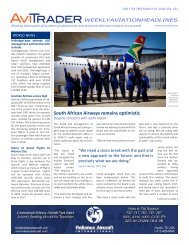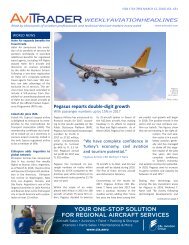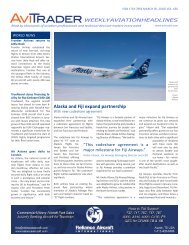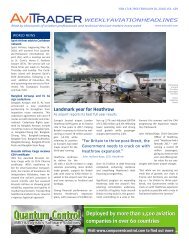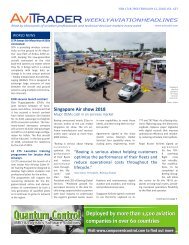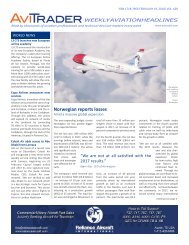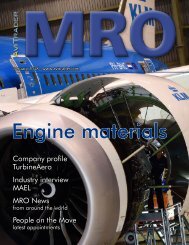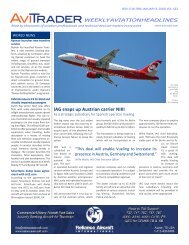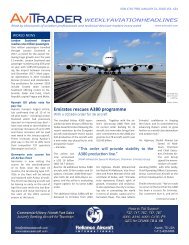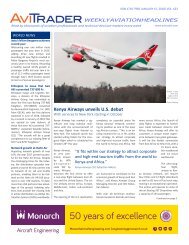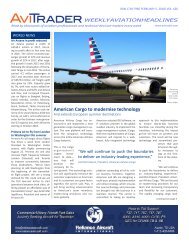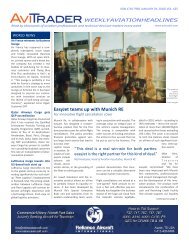AviTrader_Monthly_MRO_e-Magazine_2017-12
AviTrader_Monthly_MRO_e-Magazine_2017-12
AviTrader_Monthly_MRO_e-Magazine_2017-12
You also want an ePaper? Increase the reach of your titles
YUMPU automatically turns print PDFs into web optimized ePapers that Google loves.
Industry report<br />
24<br />
MTU Aero Engines<br />
substantiates outlook to 2025<br />
<strong>2017</strong> is the last year of MTU’s investment phase.<br />
Photo: MTU<br />
A<br />
t its investor and analyst day <strong>2017</strong>, MTU Aero Engines AG<br />
provided a concrete outlook for the period to 2025. <strong>2017</strong><br />
marks the end of the company’s most substantial investment<br />
phase, from which it emerged with an increased<br />
adjusted EBIT margin. In 2018, MTU will move into a consolidation<br />
phase during which the company expects a continuing rise in<br />
earnings and substantially higher free cash flows. Between now and<br />
2025, the company aims to boost its average cash conversion rate<br />
into the high double digits through the combined effect of a moderate<br />
increase in working capital and a decrease in the cash flow from<br />
investing activities. The cash conversion rate measures the proportion<br />
of net income converted into free cash flow.<br />
MTU Aero Engines AG CEO Reiner Winkler comments: “During the<br />
consolidation phase, we expect to see more stable growth in the new<br />
engine business, accompanied by improved profit margins. The strong<br />
growth in our highly profitable spare parts sales and commercial<br />
maintenance business is likely to continue, even though margins in<br />
our commercial <strong>MRO</strong> business will remain under pressure. There are<br />
signs of potential growth in our military business as of 2020.” Looking<br />
ahead to a next investment phase, Winkler says: “Our long-term<br />
objective is to acquire higher shares in future engine programs than<br />
before.”<br />
<strong>2017</strong> is the last year of MTU’s investment phase. During the period<br />
from 2014 to <strong>2017</strong>, the company experienced its strongest growth in<br />
the commercial maintenance business. Spare parts sales also grew<br />
substantially. “Business in both sectors developed better than we had<br />
assumed when we embarked on our investment phase,” says Winkler.<br />
Delays led to a moderate growth in the commercial engine business<br />
and to declines in military engine business. MTU had initially projected<br />
strong growth in the commercial engine business and a stable military<br />
engine business. Winkler adds: “This mix enabled us to improve our<br />
adjusted EBIT margin during the investment phase.” The original forecast<br />
was for a stable level of margins.<br />
In 2018, the commercial OEM business is likely to achieve the strongest<br />
growth, with a predicted 30-percent increase in revenues. The commercial<br />
maintenance business is also expected to grow, with revenues<br />
increasing by a percentage in the high teens, while spare parts sales<br />
are expected to increase by a mid-single-digit percentage. Revenues in<br />
the military engine business are forecast to remain at the same level as<br />
in <strong>2017</strong>. “This makes 2018 a transition year with a moderate increase<br />
in adjusted EBIT and a growing cash conversion rate,” says Winkler.<br />
The amended version of the IFRS 15 reporting standard is effective for<br />
annual periods starting on or after January 1, 2018. The main changes<br />
concern the recognition of payments to customers, including concessions,<br />
the acquisition of program shares and development costs. In<br />
future, such expenses will be recognized as deductions from revenue,<br />
rather than costs. “This has an impact on reported revenues, which will<br />
be lower than before when calculated on the basis of the amended<br />
version of IFRS 15,” explains Peter Kameritsch, the designated CFO<br />
and CIO of MTU Aero Engines. “However, this will have little impact<br />
on earnings, and even lead to an improvement in our profit margins.”<br />
If the amended version of IFRS 15 had been applied in 2016, group<br />
revenues would have amounted to €3,288 million rather than the reported<br />
€4,733 million, while adjusted EBIT for the year would have<br />
<strong>AviTrader</strong> <strong>MRO</strong> - December <strong>2017</strong>



